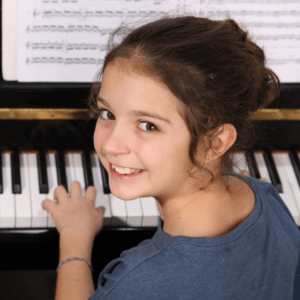Ten years ago, my husband Steven taught piano lessons to a bright young girl named Jade. Jade was a fun, social third grader who never met a stranger. She excelled at gymnastics and horse riding. She was a natural performer who loved an audience. Jade caught on quickly to math concepts, but reading, spelling, and memorization were much harder. Jade was dyslexic.
Using flashcards, mnemonics (remember Every Good Boy Does Fine?), Steven taught Jade the notes of the staff and simple tunes using the ubiquitous Alfred series. Jade practiced throughout the week, but she made very little progress in learning to read music. To read each note, Jade had to start at the bottom of the music staff and count up using FACE or EGBDF. Every single note had to be figured out afresh. It was like the movie Groundhog’s Day, where the main character relieves the same day over and over again. Jade was unable to determine the next note relative to the one before it on the staff. Frustrations began to mount for both teacher and student! Piano lessons stopped being enjoyable for lack of progress.

As Steven and I grew in our knowledge of dyslexia, we learned that reading music can be incredibly difficult for some dyslexics. Reading music involves the interpretation of symbols, just like reading words involves the interpretation of alphabet letters. Difficulty in reading music may depend somewhat on the instrument of choice. For example, drum notations are very different from piano or violin. Instead, some dyslexic music students have more success in learning to play by ear or to sing using the solfege method.
Music and reading both have auditory components. Can musical training help give dyslexics a boost? Admittedly, there’s not enough research to draw firm conclusions, but dyslexics certainly can be successful musicians and performers. Music can be a refuge and outlet for those who are struggling in the general education classroom. Just ask musicians like Carly Simon. As a young girl, her dyslexia, stuttering, and facial tics brought such anxiety she wanted to quit school. The rhythm of music helped bring her under control and gave her life a new meaning.
Should you discourage your child from learning to play an instrument? Not at all! Check out this article with FAQ about dyslexia and learning music from Understood.org. Let your child try! Communicate with your child’s teacher about dyslexia and let them know that multi-sensory ways of learning are best. You may unlock a door to a lifetime of musical enjoyment for your whole family!
Tell us about your child’s musical experience! Leave us a comment below!
